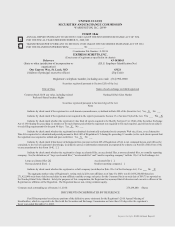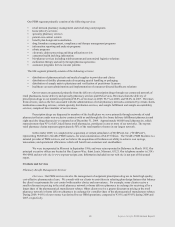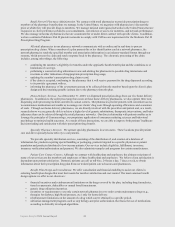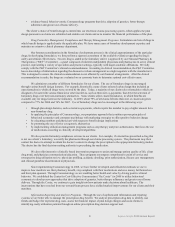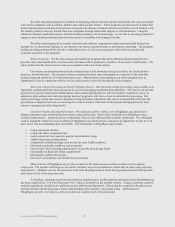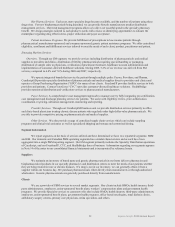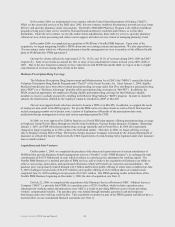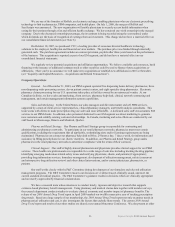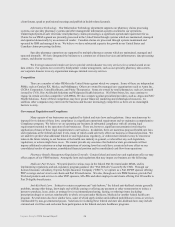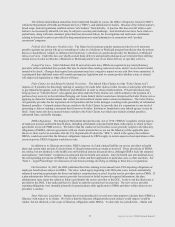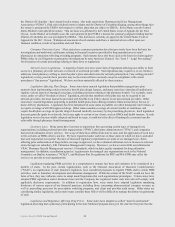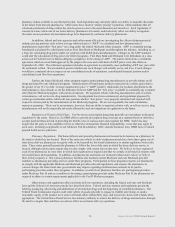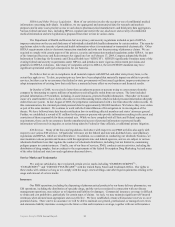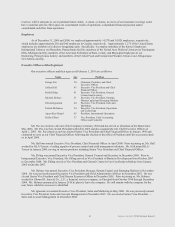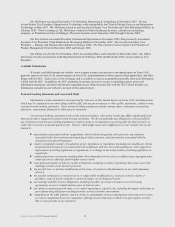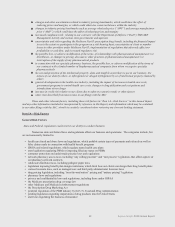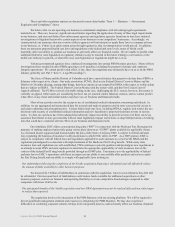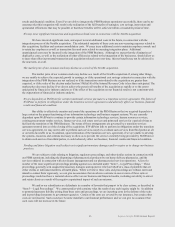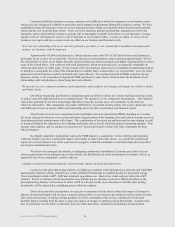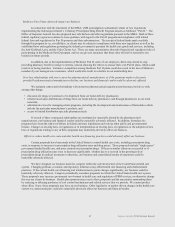Express Scripts 2009 Annual Report Download - page 29
Download and view the complete annual report
Please find page 29 of the 2009 Express Scripts annual report below. You can navigate through the pages in the report by either clicking on the pages listed below, or by using the keyword search tool below to find specific information within the annual report.
Express Scripts 2009 Annual Report
27
The federal anti-kickback statute has been interpreted broadly by courts, the Office of Inspector General (“OIG”)
within the Department of Health and Human Services (“HHS”), and administrative bodies. Because of the federal statute’s
broad scope, federal regulations establish certain “safe harbors” from liability. A practice that does not fall within a safe
harbor is not necessarily unlawful, but may be subject to scrutiny and challenge. Anti-kickback laws have been cited as a
partial basis, along with state consumer protection laws discussed below, for investigations and multi-state settlements
relating to financial incentives provided by drug manufacturers to retail pharmacies in connection with “product
conversion” programs.
Federal Civil Monetary Penalties Law. The federal civil monetary penalty statute provides for civil monetary
penalties against any person who gives something of value to a Medicare or Medicaid program beneficiary that the person
knows or should know is likely to influence the beneficiary’s selection of a particular provider for Medicare or Medicaid
items or services. Under this law, our wholly-owned home delivery and specialty pharmacies are restricted from offering
certain items of value to influence a Medicare or Medicaid patient’s use of our home delivery or specialty services.
Prompt Pay Laws. Under Medicare Part D and certain state laws, PBMs are required to pay retail pharmacy
providers within established time periods that may be shorter than existing contracted terms, and/or via electronic transfer
instead of by check. Changes that require faster payment may have a negative impact on our cash flow from operations. It
is anticipated that additional states will consider prompt pay legislation and we cannot predict whether a state or state(s)
will adopt such legislation or what effect it will have.
False Claims Act and Related Criminal Provisions. The federal False Claims Act (the “False Claims Act”)
imposes civil penalties for knowingly making or causing to be made false claims or false records or statements with respect
to governmental programs, such as Medicare and Medicaid, in order to obtain reimbursement. Private individuals may
bring qui tam or “whistle blower” suits against providers under the False Claims Act, which authorizes the payment of a
portion of any recovery to the individual bringing suit. Some federal district courts have interpreted the False Claims Act as
applying to claims for reimbursement that violate the anti-kickback statute under certain circumstances. The False Claims
Act generally provides for the imposition of civil penalties and for treble damages, resulting in the possibility of substantial
financial penalties. Criminal statutes that are similar to the False Claims Act provide that if a corporation is convicted of
presenting a claim or making a statement that it knows to be false, fictitious or fraudulent to any federal agency it may be
fined. Some states also have enacted statutes similar to the False Claims Act which may include criminal penalties,
substantial fines, and treble damages.
ERISA Regulation. The Employee Retirement Income Security Act of 1974 (“ERISA”) regulates certain aspects
of employee pension and health benefit plans, including self-funded corporate health plans with respect to which we have
agreements to provide PBM services. We believe that the conduct of our business is not generally subject to the fiduciary
obligations of ERISA, and our agreements with our clients provide that we are not the fiduciary of the applicable plan.
However, there can be no assurance that the U.S. Department of Labor (the “DOL”), which is the agency that enforces
ERISA, would not assert that the fiduciary obligations imposed by ERISA apply to certain aspects of our operations or that
courts in private ERISA litigation would not so rule.
In addition to its fiduciary provisions, ERISA imposes civil and criminal liability on service providers to health
plans and certain other persons if certain forms of illegal remuneration are made or received. These provisions of ERISA
are similar, but not identical, to the health care anti-kickback statutes discussed above, although ERISA lacks the statutory
and regulatory “safe harbor” exceptions incorporated into the health care statutes. Like the health care anti-kickback laws,
the corresponding provisions of ERISA are broadly written and their application to particular cases is often uncertain. See
“Item 3 – Legal Proceedings” for discussion of current proceedings involving us relating to these laws or regulations.
On November 16, 2007, the DOL published final rules relating to the annual Form 5500 reporting obligations of
employee benefit plans subject to ERISA. The rules, which apply beginning with 2009 plan years, include substantially
enhanced reporting requirements for direct and indirect compensation received by plan service providers such as PBMs. If
a plan administrator believes that a service provider has refused or failed to provide required information, the plan
administrator must report the refusal or failure and identify the service provider to the DOL. In the event this disclosure is
provided to the DOL, it has indicated that it is likely to audit the reported service provider. The new service provider
reporting obligations were intended primarily for pension plans, their application to PBMs and other welfare plan service
providers is unclear.
State Fiduciary Legislation. Statutes have been introduced in several states that purport to declare that a PBM is a
fiduciary with respect to its clients. We believe that the fiduciary obligations that such statutes would impose would be
similar, but not identical, to the scope of fiduciary obligations under ERISA. To date only two jurisdictions – Maine and


